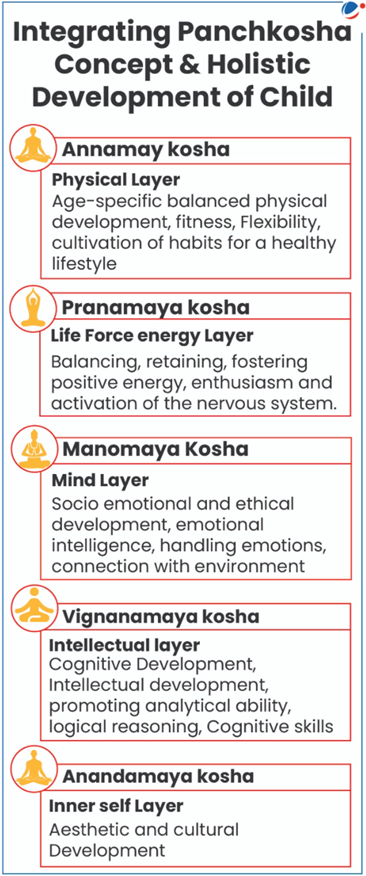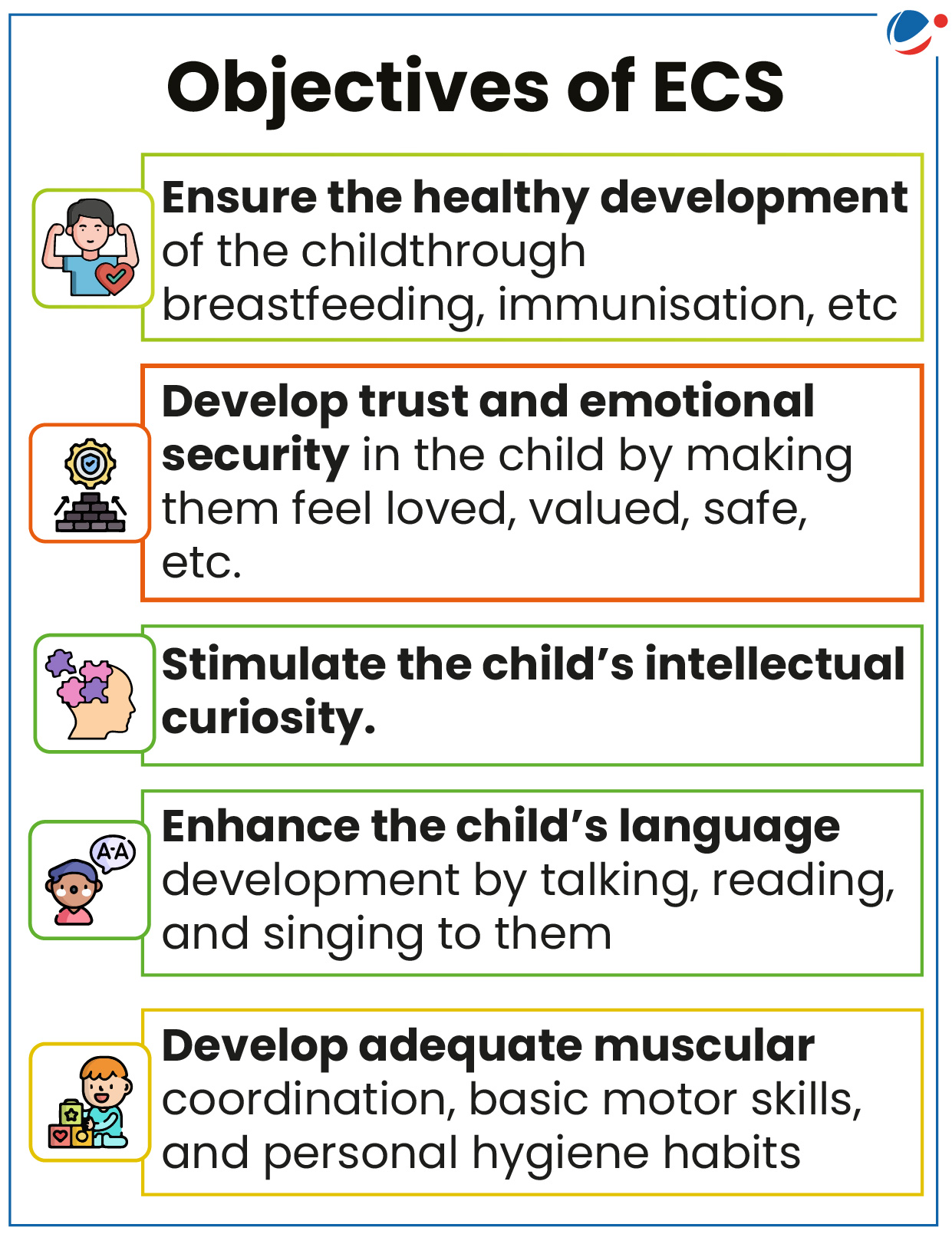Why in the News?
Ministry of Women and Child Development (MoWCD) launched Aadharshila a National Curriculum for Early Childhood Care and Education (ECCE) for Children from Three to Six Years, 2024

About the Early Childhood Care and Education (ECCE)
- Early Childhood Care and Education (ECCE) in the Indian context is generally defined as the care and education of children from birth to eight years. It includes:
- Early stimulation programmes through crèches/homes stimulation for 0-3 year olds.
- Early childhood education (ECE) programmes for 3-6 year olds (as seen in anganwadis, balwadis, nurseries, preschools, kindergartens, preparatory schools, etc.).
- Early Primary Education Programmes as part of schooling for 6-8 year olds.
- Government of India adopted the National Early Childhood Care and Education (ECCE) Policy in 2013.
- National Education Policy (NEP) 2020 and National Curriculum Framework for Foundational Stage (NCF-FS) 2022 have recognized the critical role of ECCE in the country.
- The NCF-FS institutionalized guidelines specifically tailored for fostering high-quality ECCE for 3-6 years and the age group of 0-3 years.
- Aadharshila, the National Curriculum for ECCE 2024 address this need.
- Objective of the National ECCE Curriculum 2024 (3-6 years) is to improve the quality of early childhood education transacted at the Anganwadi Centre, by prioritising competency-based lesson plans and activities, covering all learning domains.
- 85% of brain development occurs before the age of 6 years.
Key highlights of the policy
- ECCE is based on the Panchakosha concept. It is rooted in ancient wisdom and provides clear pathways toward a holistic education and ensures a comprehensive and balanced approach to nurturing the child's body, mind, and spirit.
- Teaching Language and Literacy in Early Years: Focus on developing children's emergent Literacy Skills like print awareness, drawing, scribbling, etc.
- It also focus on developing Mathematical Concepts.
- Positive Learning Habits (Executive Function and Self-Regulation Skills): Focus on establishing routines, establish an atmosphere of positive relationship, empowering the child to lead and make independent choices.
- Play as Learning: Knowledge acquired through play becomes a lasting part of the child's experience.
- Some of the play-based activities are, puzzles, roleplaying, reading books, Story creation, language and math games, guided walks.
- Others
- Embracing learning diversity in the Anganwadi Centre is crucial for Anganwadi educators.
- Ensuring gender equality from an early age is crucial, because gender initiation and internalization start early, influencing children's self-concept, aspirations, and behaviour.
- Divyang Inclusion
- The Anganwadi Protocol for Divyang Children was released by the Ministry of Women and Child Development in 2023, providing for screening, inclusion and referrals of children with disabilities.
Initiatives for ECCE in India
Global initiatives:
|
Challenges of ECCE
- Inadequate funding: In 2020-21, the public expenditure on early childhood care and education was a mere 0.1 percent of GDP.
- Infrastructure, Material and Classroom Environment: ECCE centres are lacking in age and developmentally appropriate equipment and play materials.
- Teachers: Issues with the teachers pertain to their qualification, appointment, salary and training/ capacity building.
- It is a challenge for the ECCE teacher/ caregiver to cope with different languages at the same time in an early childhood setting.
- Uncertain process of Admission: There is not much clarity and transparency on the process of admission of children in ECCE centres in terms of date of admission, age, etc.
- Monitoring and supervision: There is no clear monitoring and supervision mechanism for ensuring the quality of ECCE centres at macro and micro level.
- Overburdened India's childcare support system: There is one Anganwadi worker for every 22 children under Saksham Anganwadi and Poshan 2.0, and one District Child Protection Officer for every 69 children under Mission Vatsalya.
- Convergence/Coordination: Different ministries and institutions address different needs of the children related to their education, care, health and safety.
Way forward
- Expansion and strengthening of ECCE facilities: Universal access to high-quality ECCE in the country, with a special focus on districts and locations that are particularly socio-economically disadvantaged, will be provided in a phased manner.
- Regulatory framework: States must create a regulatory framework for early education, including registration and accreditation of centers, to ensure quality outcomes.
- Research, Evaluation and Documentation: Action research and impact studies should also be taken up to generate innovative and successful models.
- Recognise ECCE as a statutory obligation of MoWCD: The overall charge of the entire gamut of ECCE (including the 'care' components) should be retained with MoWCD.
- The responsibilities of providing pre-school education (ECE or early childhood education) can be undertaken by the Ministry of Education.
- Others
- Pedagogy should be more child-led than teacher-led.
- Need to advocate for ECCE and ensure government funds are invested in sustainable solutions.
- Ensures availability and time dedication of Anganwadi teachers (AWTs).
- CSR funds can help in expanding the quality and coverage of childcare.
 Related News
About Early Childhood Stimulation (ECS)
|




